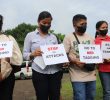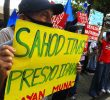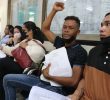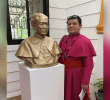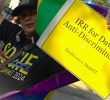The oral procedure in the case of Prof. Jose Maria Sison against the Council of the European Union for unjustly maintaining him in the so-called terrorist blacklist without any concrete evidence against him for any specific act of terrorism was conducted and concluded at the European Court of Justice in Luxembourg last April 30, 2009.
Prominent German human rights lawyer Eberhard Schultz gave a factual presentation of who is Prof. Jose Maria Sison and what is his role in the progressive movement in the Philippines in order to explain why several governments, including the Philippine, Dutch and US governments, have collaborated in his political persecution and have used the Council of the European Union to blacklist him as a terrorist for narrow political purposes rather than for any legal reason related to the fight against terrorism.
Jan Fermon, lead lawyer in the case, took up the legal issues in the Prof. Sison case. He pointed out that the Council of the EU did not meet the basic legal requirements for putting Prof. Sison in the blacklist. According to Article 1 (4) of the Common Position 2001/931 and Article 2/3 of Regulation 2580/2001, listing a person must be : 1) on the basis of precise information or material, 2) that a decision has been taken by a competent authority in respect to the person concerned, 3) concerns instigation of investigations or prosecution, 4) for a terrorist act, an attempt to perpetrate, participate in or facilitate such a act; and 5) based on serious and credible evidence or clues or condemnation for such deeds.
Fermon held responsible the Council of the EU and the Dutch government as intervener for misrepresenting the judgments of the Dutch Council of State in 1992 and 1995 and the Dutch Law Uniformity Chamber in 1997 on the asylum case of Prof. Sison as condemnations of him for terrorism. In fact, said court judgments recognized him as a political refugee under Article 1 A of the Refugee Convention, and ruled that he had no criminal liability whatsoever that would exclude him as a political refugee. It is ridiculous for the Dutch government and the Council of the EU to take out of context certain passages in the aforesaid Dutch court judgments in 1992, 1995 and 1997 which refer to unproven secret intelligence reports about events which had occurred before 1990.
Fermon also held responsible the Council of the EU and the Dutch government for once more misrepresenting judgments of the District Court of the Hague on 13 September 2007 and the Dutch Appeal Court on October 3, 2007 on false murder charges against Prof. Sison as judgments
condemning him for terrorism. In fact the court decisions released Prof. Sison from detention on the ground of insufficent evidence for the charges of inciting murder. Fermon pointed out that the Dutch
prosecution service closed the prosecution of Prof. Sison in accordance with judgments of the Dutch district court, appellate court and the examining judge.
The lawyers of the Council of the EU and the Dutch government conceded that the termination of the prosecution of Prof. Sison was a new element which must be taken into account in further considerations by the bodies concerned with blacklisting him. But cleverly or deviously they declared
that they could not say what these bodies would decide and they implied that everyone and even the court would have to wait for their decisions.
The presiding judge asked the lawyer of the Dutch government why after all these years the Dutch government had never initiated any criminal investigation of Prof. Sison for terrorism. Said lawyer was at a loss to give a straightforward answer but merely muttered that there was no need
for any criminal investigation for someone to be blacklisted as a terrorist. The presiding judge also asked Jan Fermon to submit within seven days the official documentation of the statement of the Dutch foreign minister soon after the terrorist blacklisting of Prof. Sison in 2002 that there was nothing to start a criminal investigation against him.
As early as 1990, nearly two decades before 9-11, the Dutch justice ministry made a negative decision on Prof. Sison’s application for asylum by disregarding evidence that the Aquino regime had nullified all
the charges made against him by the Marcos fascist regime and had allowed his reinstatement as faculty member in the state-owned University of the Philippines in 1986 and by falsely accusing him of
being intellectual author of the violent acts of the New People’s Army on the basis of false allegations supplied by the Philippine military authorities.
Since then, however, a Philippine court dismissed the 1988 subversion charge against Prof. Sison in 1992 after the repeal of the Anti-Subversion Law in the same year. Manila prosecutors also dismissed
in 1994 the 1991 charge of multiple murder against him (arising from the Plaza Miranda bombing of 1971) on the ground that it is based on pure speculation. The Philippine justice secretary issued a certification in 1998 that there was no pending criminal charge against Prof. Sison, thus belying the false allegations used by the Dutch justice ministry in its negative decisions of 1990, 1993 and 1996 in the Prof. Sison’s asylum case.
Since August 13, 2002 when the Dutch government blacklisted Prof. Sison as a terrorist, it has never subjected him to any criminal investigation for any act of terrorism. In fact, soon after the blacklisting, the Dutch foreign minister declared in parliament on October 8, 2002 that that there was nothing to start a criminal investigation against Prof. Sison in connection with the allegation of terrorism. Moreover, since Prof. Sison’s arrest on August 28, 2007 on the charge of inciting the murder of some Philippine military agents, the Dutch government has not uncovered any act of terrorism by Prof. Sison, despite strenuous attempts to establish that he is the chairman of the Communist Party of the Philippines.
The Dutch government spent millions of euros to interrogate witnesses provided by the Philippine government, to search and seize 6.3 million pieces of documents, computers and other electronic equipment from the NDFP information office, to raid the house of Prof. Sison and six other houses of Filipinos in The Netherlands and to surveil and wiretap numerous suspects for several years. But no evidence whatsoever has been found against Prof. Sison. His possession of some documents of the NDFP, CPP and NPA as well as those of the Philippine government is related to his prominent role as chief political consultant in the GRP-NDFP peace negotiations.
Since 2002, Prof. Sison has been unjustly listed every six months as a ‘terrorist’ by the Council of EU and has been prohibited from taking legal residence in The Netherlands, earning a living, having a bank
account and conducting financial transactions, receiving social payments for living allowance, housing in his name, adequate insurance, old age pension and the like, and travelling freely.
Prof. Sison will continue to suffer inhuman treatment by the Dutch government and the European Union for so long as he is blacklisted by the Council of the EU. Of larger significance is that the rule of law
would be subverted in Europe if the European Court fails to rule against the arbitrary terrorist blacklisting of people. The Bush mentality and the fascist trend would be unduly favored, especially under the present conditions of severe financial and economic crisis comparable to those
of the Great Depression.
For the purpose of pressuring the NDFP towards capitulation in its peace negotiations with the GRP, the Arroyo regime requested the US, European and other governments to blacklist the CPP, NPA and the NDFP chief political consultant in peace negotiations. But the blacklisting is blatantly anomalous and unjust for several reasons.
First, the CPP is legal in the Philippines due to the repeal of the Anti-Subversion Law in 1992. Second, the persons involved in the violent acts of revolution or belligerency of the NPA are chargeable for
rebellion and not for terrorism and the NPA has never engaged in any violent act outside of the Philippines. Third, Prof. Sison ceased to be the chairman of the CPP Central Committee upon his arrest in 1977. He has played a prominent role in Philippine politics by using his right to free speech on vital issues, advancing the GRP-NDFP peace negotiations and helping in the making of twelve GRP-NDFP agreements, including the Comprehensive Agreement on Respect for Human Rights and International
Humanitarian Law.
The European Court of First Instance is expected within the next few months or within one year to make a judgment on the complaint of Prof. Sison and his demand for the removal of his name from the terrorist blacklist. The court hearing last April 30 carried out and concluded the oral procedure in the case. This followed an earlier phase of written procedure, which had run for nearly two years.
Prof. Sison is represented by Jan Fermon as lead lawyer, the German lawyers Eberhard Schultz and Wolfgang Kaleck, the Filipino lawyer Romeo T. Capulong, the French lawyer Antoine Comte and Dutch lawyer Dundar Gurses. The International DEFEND Committee provides moral and material support to Prof. Jose Maria Sison.
Issued by the International DEFEND Committee
For reference:
Jan Fermon at cell phone +32-475441896.
Coni Ledesma of International DEFEND Committee at +31-6-246 76 537

